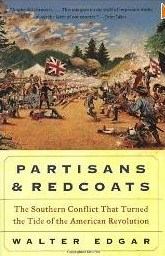Walter Edgar
Partisans and Redcoats: The Southern Conflict that Turned the Tide of the American Revolution

This is a nice and short little book. A fast read, as much as it seems to have been written: in a hurry (it ends quite abruptly too). The social environment is well described, from the personal accounts of many protagonists on both sides, to the battles and skirmishes that took place along the broad map of South Carolina. It was as crude as all civil wars: Fathers against sons in some cases. A very visual account, and fast paced.
If only it were a little more organized, geographical and chronological-wise. The action takes place as soon in the piedmont as in the low-country, and we move from one family or protagonist to another at lightening speed. Easy to get a little confused. But it does convey the general picture well. Yes, you can get the general idea of what the Revolution meant for South Carolina in this little book. What a tough people the Scots-Irish are. God bless them and the South.
